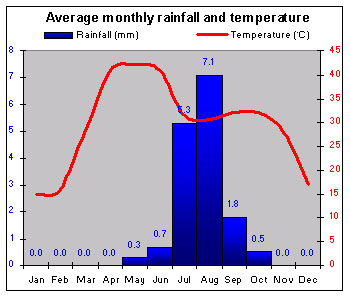COUNTRY INFORMATION |
Introduction |
Bordered by the Red Sea, Sudan is the largest country in Africa. Its landscape changes from desert in the north to lush tropical in the south, with grassy plains and swamps in the center. Tensions between the Arab north and African south have led to two civil wars since independence from British and Egyptian rule in 1956. The second of these conflicts remains unresolved. In 1989, an army coup installed a military Islamic fundamentalist regime. |
|
Climate |
 |
Sudan's northern half is hot arid desert with constant dry winds. The rest has a rainy season varying from two months in the center to eight in the south. |
|
People |
| Languages |
Arabic, Dinka, Nuer, Nubian, Beja, Zande, Bari, Fur, Shilluk, Lotuko |
|
| URBAN/RURAL POPULATION DIVIDE |
|
|
|
Sudan has a large number of ethnic and linguistic groups. About two million Sudanese are nomads. The major social division, however, is between the Arabized Muslims in the north and the mostly African, largely animist or Christian population in the south. Attempts to impose Arab and Islamic values throughout Sudan have been the root cause of the civil war that has ravaged the south since 1983. There are some non-Arab groups in the north and the densely populated Darfur region. Women not wearing Islamic dress can suffer harassment or even public flogging. In 2002 the UN reported that thousands of people have been abducted into slavery within Sudan over the last 20 years. |
|
Economy |
| GNP (US$) |
9599
|
M |
GNP World rank |
84
|
|
| Inflation |
16 |
% |
Unemployment |
4 |
% |
|
StrengthsOil, gas, cotton, gum arabic, sesame, sugar. Some gold mining. WeaknessesLow industrialization. Lack of foreign exchange for importing energy and spare parts for industry. Drought. Little transportation infrastructure. Huge distances between towns. Civil war delayed the exploitation of oil reserves. Alienation of Arab donors and investors. |
|
Politics |
| Lower house |
Last election |
2000 |
Next election |
2004 |
| Upper house |
Last election |
Not applicable |
Next election |
Not applicable |
|
Elections in 2000, under the 1999 constitution allowing "political associations," were boycotted by the opposition, and returned Gen. Omar Bashir and his NC bloc to power. The willingness of the Sudanese People's Liberation Army (SPLA) and its former rival, the Sudan People's Defense Force (SPDF), to enter peace talks raised the possibility of an end to nearly 20 years of civil conflict between Muslim north and Christian south. However, increasing hostilities in the oil-rich Upper Nile region in spring 2002 put the peace process at risk. |
|
Resources |
| Minerals |
Oil, gas, gold, copper, gypsum, marble, mica, silver, chromium, zinc |
|
| Oil reserves (barrels) |
300m barrels |
Oil production (barrels/day) |
200,000 b/d |
|
Large oil and gas reserves were found in the south in the 1980s; oil exports started in 1999. The half-thermal, half-hydroelectric generating capacity is insufficient, and week-long power cuts are frequent. Gold mining has the potential for expansion. |
|
Health |
| Life expectancy |
56 |
Life expect. World rank |
146 |
| Population per doctor |
10000 |
Infant mortality (per 1000 births) |
81 |
|
|
|
| Principal causes of death |
Infectious and parasitic diseases, malnutrition |
|
Health service standards in rural areas are basic. The civil war has led to an increase in communicable diseases, especially the parasitic infection leishmaniasis. |
|
Education |
| Literacy |
58 |
% |
Expend. % GNP |
4 |
%
|
|
| PERCENTAGE OF POPULATION IN FULL TIME EDUCATION |
|
| Primary |
56 |
% |
Secondary |
29 |
% |
Tertiary |
7 |
% |
|
In 1991, measures were introduced to Islamicize education. Primary school children must have two years of Islamic religious instruction, and men wishing to enter university must first serve for a year in the People's Militia. |
|
Wealth |
| Cars |
10 |
per 1,000 population |
| Telephones |
12 |
per 1,000 population |
| Televisions |
273 |
per 1,000 population |
|
Wealth is limited to the NC and southern rebel elites. Most of the population struggles to survive.
|
History |
Northern Sudan was taken by Egypt in 1821, the south by Britain in 1877. - 1882 British invade Egypt.
- 1883 Muslim revolt in Sudan led by Muhammad Ahmed, the Mahdi.
- 1898 Mahdists defeated. Anglo-Egyptian condominium set up.
- 1954 Becomes self-governing.
- 1955 Rebellion in south starts 17 years of civil war.
- 1956 Independence as republic.
- 1958–1964 Military rule.
- 1965 Civilian revolution, elections.
- 1969 Coup led by Col. Jaafar Nimeiri.
- 1972 South gets limited autonomy.
- 1973 Sudanese Socialist Union is sole party.
- 1983 Southern rebellion resumes. Sharia law imposed.
- 1984 Devastating drought.
- 1986 Army coup.
- 1989 Gen. Omar Bashir takes over.
- 1991 Sharia penal code instituted. Pro-Iraq stance in Gulf War.
- 2000 Bashir ousts fundamentalist al-Turabi from leadership of NC.
- 2002 SPLA signs cease-fire. Fighting between rival factions over southern oil reserves escalates.
|
|